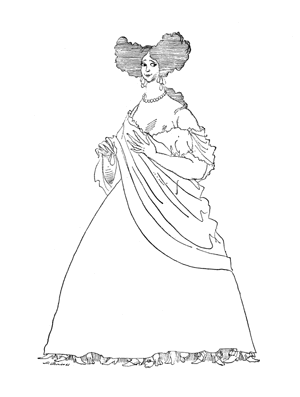In the old Europe of the Kings, a man could rise from a humble station to all power, short of royalty, and govern a country which was not even his native land. Such was the career of Cardinal Mazarin. He was not a laborer’s son, like Alberoni, or a butcher’s son, like Wolsey; he belonged to what would now be called the lower middle class—his mother was a distant relation of the powerful Colonna family and his father, who came of Sicilian peasant stock, was employed by Prince Colonna in a clerical capacity. Young Mazarin, a brilliant boy, took minor orders in the Church, accompanied a Papal legate to France, and in due course was himself appointed Nuncio. Then he became the right-hand man of Cardinal Richelieu. At a court where nobody could drive with the King unless he could prove his seize quartiers of nobility, Mazarin was the closest friend (probably the lover, possibly the husband) of the Queen Mother; after the death of Richelieu he was all powerful in France. He saw the little boy, Louis XIV, through turbulent times, taught him the love of pictures and the art of statesmanship, and tactfully died when the King was beginning to think he would like to rule on his own. Mazarin left priceless books and pictures, a palace which is now the Bibliothèque Nationale, a settled realm, and his nieces.
THERE WERE SEVEN of these beauties for whom the Cardinal arranged dazzling marriages; many notabilities descended from them and their sons included Prince Eugene of Savoy and the Old Pretender. The most famous of the nieces was Marie Mancini, who may have been the original of Perrault’s Cinderella as well as of Racine’s Bérénice. As a child she was the plain one of the family and had an obstinate, difficult nature; her mother did not care for her and wanted to put her in a convent but she stood out against this with such determination that finally she was allowed to make her debut at the Court of Louis XIV. Her sisters were already the stars of the young King’s little set. Louis took a fancy to her; she fell violently in love with him and blossomed into a beauty. She believed that he intended to marry her and perhaps he did for a while, but if so Mazarin changed his ideas by dangling the huge Spanish possessions before his eyes. France has always wanted frontiers at the Rhine, the mountains, and the sea—the Spanish Netherlands and the Franche Comté would have rounded off Louis XIV’s inheritance. If he were to marry his cousin the Spanish Infanta, who had no brother, these lands might well devolve upon him. (In the event, her father, Philip IV of Spain, so delicate that he was said to live on human milk, married a second wife and produced an heir, to the general amazement.) Mazarin had long planned the Franco-Spanish marriage; he was not at all inclined to abandon it in favor of a strong-willed niece whom he had never liked, who could not abide him and who might well encompass his downfall if ever she should find herself in power. He went on treating for the Infanta; but the Spanish King held back. The French King, leaving affairs of State in the hands of Mazarin, pursued his love affair with Marie. Then the Spanish King changed his mind. The French King did not hesitate between love and ambition; Marie Mancini was given to understand that she could be his mistress but never his wife. Her pride, obstinacy, and self-esteem made such a role impossible; for her it must be marriage or nothing. This strictness was not the result of piety—she seems not to have believed in God as much as in astrology, soothsayers, and her Fate—but of a feeling that if she gave way she would never be able to look herself in the face. The Cardinal now thought it better to send her away from the Court. Uttering the famous words, “You are the King; you weep; and yet I depart,” she retired to a sad sea-side and lived there for months, practically alone, while the King, who still bombarded her with letters, presents, and a puppy dog, went to the Spanish frontier and married his cousin. Marie suffered. However pride forced her back to Paris to witness the state arrival there of the bride and bridegroom. The king’s love for her flared up again; once more she was given the chance of being maîtresse en titre and once more she refused. She decided to put an end to an equivocal situation by accepting the hand of a man she had never seen: Prince Colonna, the grandson of her grandfather’s employer. It would have seemed a brilliant match for her had not so much greater things been thought of.
Advertisement
SHE MARRIED HIM by proxy and set forth, her heart broken, on the long journey to Italy. When finally she arrived, worn out and wretched, Colonna very sensibly wasted no time on courtship; did not wait for her to say yes; he roundly raped her. The result was that she had a nervous breakdown and then fell madly in love with him. He adored her and they seem to have been happy for seven years. Then Colonna began looking at other women. As Marie was recovering from her third confinement, she found out that he had two mistresses and a bastard. She had never been able to accept the essential polygamy of man—had minded very much when Louis went to bed with her sister Olympe while courting her—now she was outraged. Colonna, who still loved his wife but felt that he was behaving quite normally and doing nobody very much harm, was astounded by the violence of Marie’s reaction. She made scene upon scene; refused to go to bed with him; and after one night of an upset stomach (a complaint known nowadays as Roman tummy) she pretended to think that he was trying to poison her. Finally she left him and their little boys forever.
She tried to go back to the French Court, but neither Louis, his wife, nor his mistress wanted her there and she was told to stay away. So she wandered about the French provinces like a poor, beautiful, untidy gypsy. Finally the Duke of Savoy took her in and she stayed with him in his small but powerful principality for some years. The Duke, who was the lover of her sister Hortense, fell in love with Marie and she, it seems, with him, but her fatal self-esteem raised the usual obstacles and their relationship remained platonic. In the end she quarrelled with him, tore herself away from his protection and fell into the clutches of her husband who, boiling for revenge, threw her into jail. Powerful friends came to her rescue and she was released after a few months. She spent the rest of her days galloping up and down the roads of Europe; she never settled anywhere; the countless men who fell in love with her were sent about their business; she lived in an emotional vacuum, until, at the age of sixty-seven, she fell dead on the pallet bed of a monk who had been helping her to make her will.
THESE ARE THE BARE BONES of a story on which Mme. Mallet-Joris has exercised her magic, wonderfully evoking the seventeenth century. Françoise Mallet-Joris, a young Belgian writer whose work is greatly admired in France, has already written one first-class historical novel about the Court intrigues which surrounded Mlle. de Lafayette and Louis XIII. A puritan who likes to write about frustrated love, she is serious, the antithesis of that other Françoise, that true daughter of Gaul, Mlle. Sagan. Perhaps too serious for me—she never tells a joke—but what a respectable writer! She is one of the excellent historical novelists of our day.
Her plan is to base a psychological study of her subject on historical facts. “How deceptive it is,” she says, “the immobility of what we look upon as the past, time that has flowed by but that is only asleep; and if a word brings it to life again it starts its questioning once more.” Mme. Mallet-Joris has the power to bring it to life and start its questioning. She approves of Marie Mancini more than I can and is sometimes a little repetitive on the subject of her efforts to keep her self-esteem bright and polished. She regards Marie as a victim and thinks that her misfortunes all came from not being loved as she deserved to be either by her mother, her uncle, her sisters, her King, or her husband. But how much did she deserve? Surely, to be loved one must love and there is little proof that Marie was capable of that. She had a most awkward character, with her ferocious virtue, which did not even come from the love of God but merely from pride, her sincerity, and her search for she knew not what. In my experience such women are doomed to frustration; the female sex is so unfortunately placed that its members have to employ a great deal of art if they are to make themselves and others happy; complaisance and subtlety are their best weapons. (The women of 1966 whistle a great deal to keep up their spirits but in fact their situation with regard to their menfolk has hardly changed since 1666.)
Advertisement
Marie certainly did not love her relations. If she had really loved Louis would she have been so prudish with him? Was it perhaps the King rather than the man who won her heart? He was not very attractive to women and the only ones who ever wanted him for himself seem to have been the Queen and Louise de la Vallière. Marie switched her affections to Colonna with unnatural speed. But her love for him, fortified as it should have been by seven years of marriage and three little boys, collapsed as soon as she found out that she was not the only woman in his life—she never made the slightest effort to see his point of view or to allow for him being a man and not a super-man. She never thought of swallowing her pride and putting him first.
Mme. Mallet-Joris extols the self-esteem which was the motive power of Marie’s existence. There are two ways of looking at self-esteem. Mme. Mallet-Joris thinks it the greatest of feminine virtues; but, fatal to peace of mind, damaging to human relationships, is it not merely a form of egotism? I give her the last word, however.
“When has a drop of grace ever watered my heart? [Marie reflects, during her last journey] When has a consoling beam soothed my tormented brain? I should have had to be a saint to have borne this emptiness….”
But when had that heart ever sought for grace? When had that obdurate mind asked for consolation? And if a saint was called for, how do you know that you were not of the stuff that saints are made of?
This Issue
April 28, 1966




